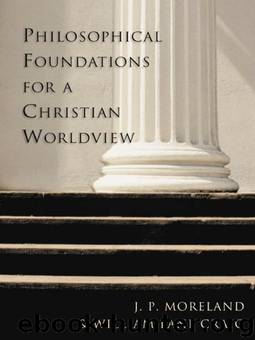Philosophical Foundations for a Christian Worldview by James Porter Moreland & William Lane Craig

Author:James Porter Moreland & William Lane Craig [Moreland, James Porter]
Language: eng
Format: epub
Publisher: Intervarsity Press - A
Published: 2009-11-07T23:00:00+00:00
2. Operationalism. Operationalism, occasionally called operationism, is an approach to science very similar to phenomenalism. Its major proponent has been P. W. Bridgman (1882-1962). Whereas phenomenalism links scientific terms, laws and theories to actual or possible sensory experiences, operationalism links them to actual or possible laboratory operations. For the phenomenalist, scientific laws and theoretical terms really refer not to mind-independent entities and events but to mind-dependent sensations. For the operationalist, scientific laws and theoretical terms really refer to experimental activities and operations. Theoretical terms are like the term “the average family” that we discussed in conjunction with SR2 above.
Bridgman stated the central tenet of operationalism in this way: “In general, we mean by any concept nothing more than a set of operations; the concept is synonymous with the corresponding set of operations. . . . The proper definition of a concept is not in terms of its properties but in terms of actual operations.”64 For example, length is not an attribute that a physical body has; rather, it is defined as a set of operations of sliding rulers, marking coincidences and counting how many operations one has made. The “length” of a room is nothing but the operation of taking a stick with thirty-six markings (call them inch markings), starting at one end of the room, and laying the stick end after end until one crosses the room, and recording all one’s activities. Similarly, the statement that x amount of some acid neutralizes y of some base means that if one pours a certain measurement of one liquid (which, in turn, is defined in terms of certain operations used to obtain it) into a beaker and adds a certain measurement of another liquid, then certain measurements follow (e.g., the combined liquids change color when the measurements are done in a certain way).
Before we move on to the next instrumentalist view, a final observation about operationalism should be made. Operationalism is reductionistic in spirit and thus is an inadequate theory. Length is a property of bodies that may be measured by a set of measuring operations, but which is not identical to or the same thing as those measurements. Thus we should be careful to distinguish operationalism as a philosophy of science from the legitimate use of operational definitions. It is quite proper to come up with some operational definition for something—say intelligence, depression or length—in which a set of measurable, empirically testable operations are formulated as a test for the thing being studied. It is one thing to say that measurements x, y and z are good tests for the presence of some phenomenon P, which is what the legitimate use of operational definitions seeks to do. However, it is another thing altogether to claim, as operationalists do, that phenomenon P is identical to, is nothing other than, measurements x, y and z. Thus one can use operational definitions without being a full-blown operationalist.
Download
This site does not store any files on its server. We only index and link to content provided by other sites. Please contact the content providers to delete copyright contents if any and email us, we'll remove relevant links or contents immediately.
The Secret Power of Speaking God's Word by Joyce Meyer(3157)
Signature in the Cell: DNA and the Evidence for Intelligent Design by Stephen C. Meyer(3123)
Real Sex by Lauren F. Winner(3002)
The Holy Spirit by Billy Graham(2938)
The Gnostic Gospels by Pagels Elaine(2517)
Jesus by Paul Johnson(2349)
Devil, The by Almond Philip C(2323)
23:27 by H. L. Roberts(2245)
The Nativity by Geza Vermes(2222)
Chosen by God by R. C. Sproul(2158)
All Things New by John Eldredge(2150)
Angels of God: The Bible, the Church and the Heavenly Hosts by Mike Aquilina(1951)
The Return of the Gods by Erich von Daniken(1925)
Angels by Billy Graham(1917)
Knowing God by J.I. Packer(1848)
Jesus of Nazareth by Joseph Ratzinger(1802)
The Gnostic Gospel of St. Thomas by Tau Malachi(1781)
How To Be Born Again by Billy Graham(1775)
Evidence of the Afterlife by Jeffrey Long(1773)
